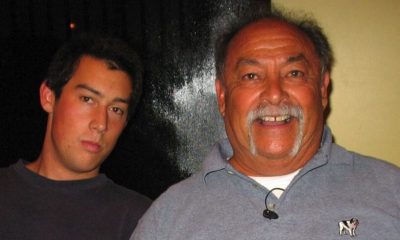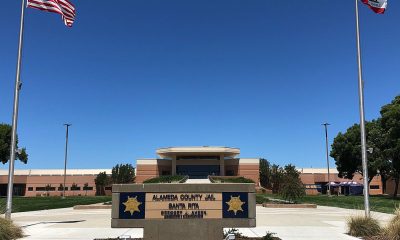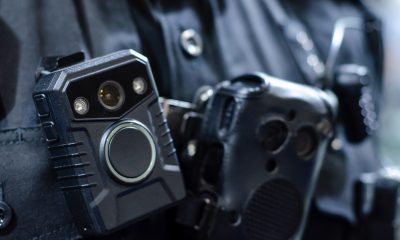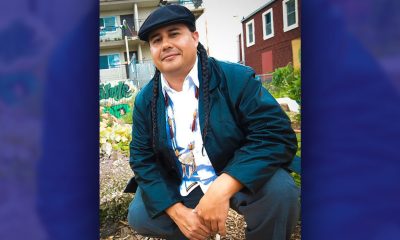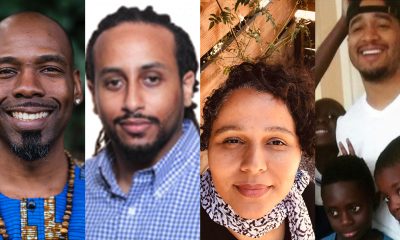Activism
‘Stop Killing Us’ Activists Bring Their Pain to State Capitol
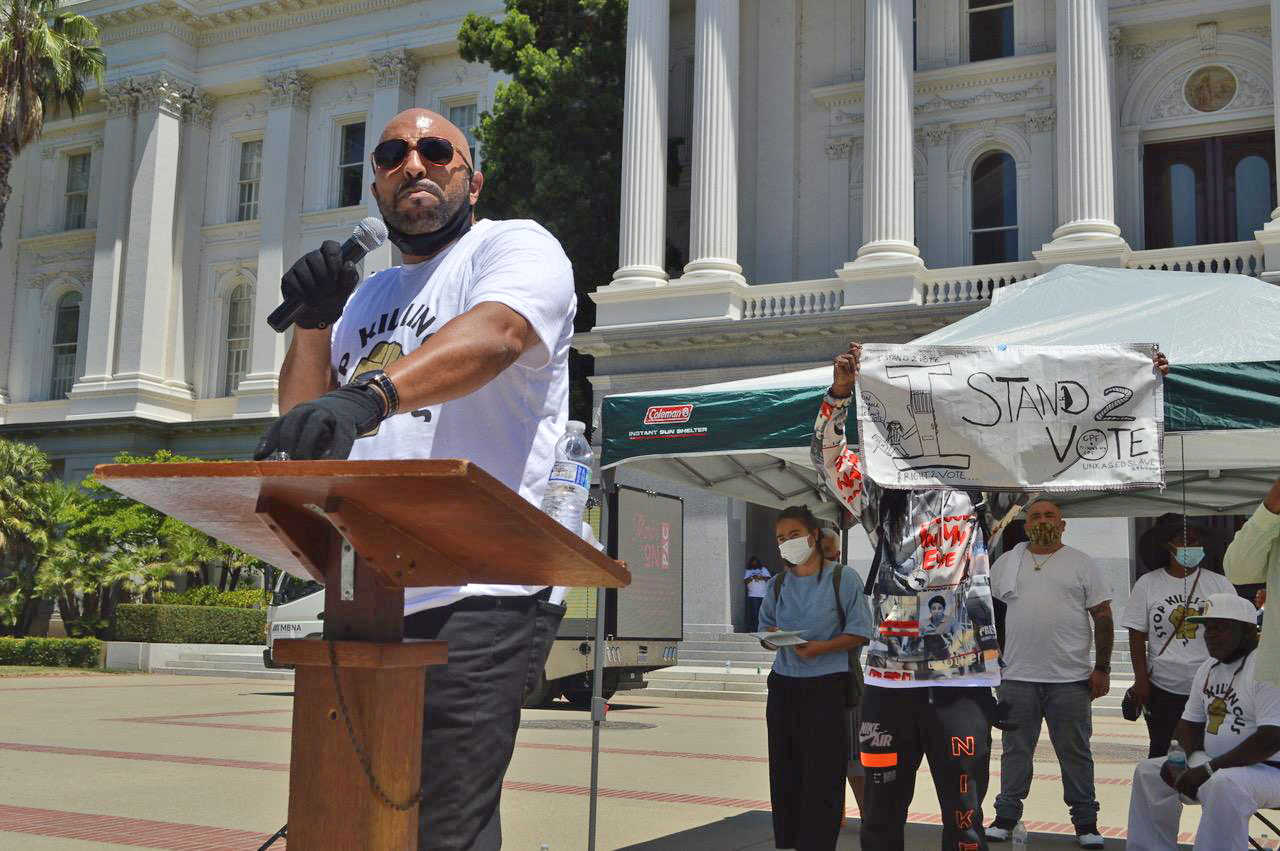
Several California social and criminal justice organizations, as well as community-based groups, gathered for a rally at the state Capitol titled “Stop Killing Us” on July 1, 2020.
Oakland-based All of Us or None (AOUON) organized the event — with the help of other partners across the state — to condemn police violence against African Americans.
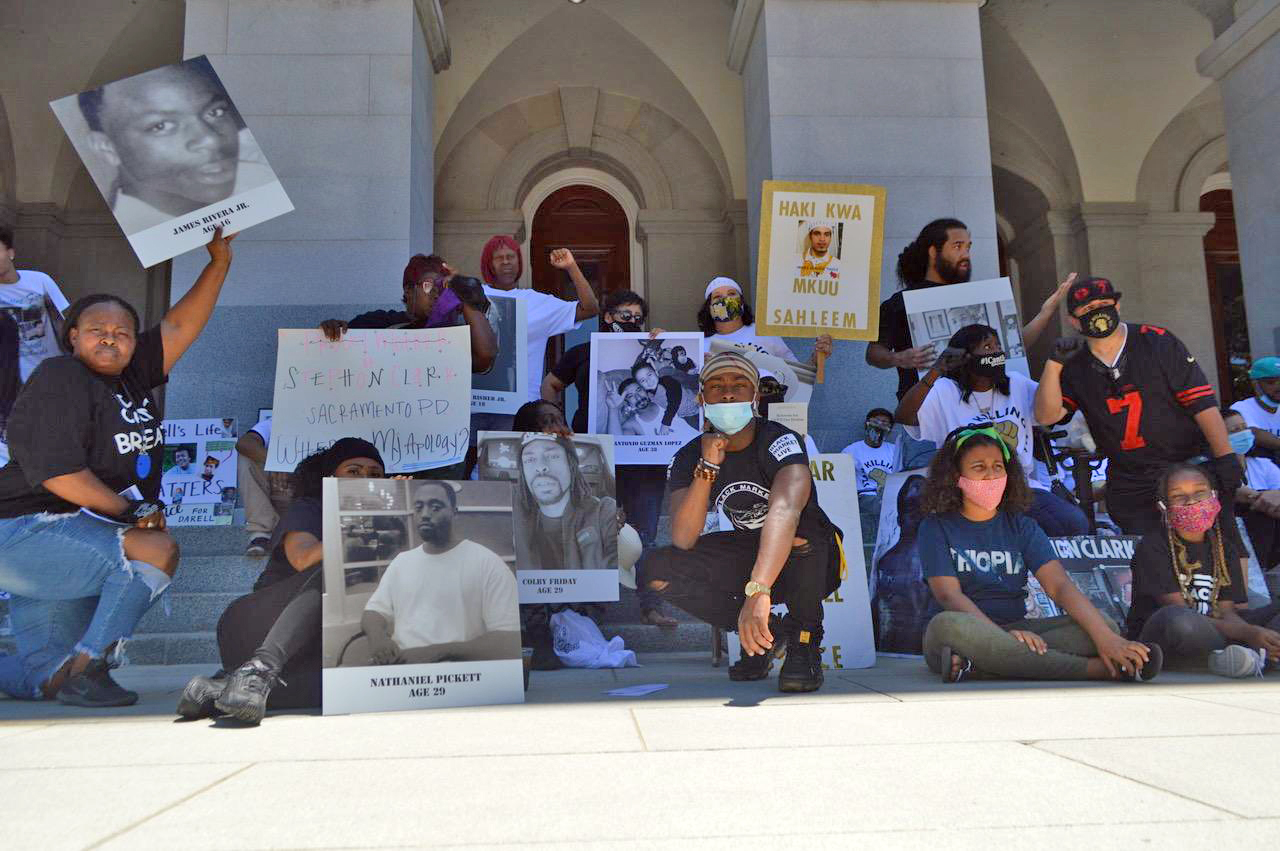
Families affected by police violence came from all across the state to participate in the Stop Killings Us Rally in Sacramento. Photo by Antonio Harvey.
AOUON is a project of Legal Service for Prisoners With Children (LSPC), a nonprofit civil rights organization that advocates for the rights of formerly and currently incarcerated people and their families.
Their demonstration was peaceful — done with official permission — and less spontaneous than recent explosive protests and riots triggered by the brutal murder of George Floyd, an unarmed Black man in Minnesota, at the hands of police officers.
But it was charged with strong convictions and a solemn sense of grief, much like those protests. The day started with libations and sacred drumming by American Indian and African American groups. Altars with photos, food offerings and a memorial quilt were also on display.
“You mess with our children, I’ll come running,” said Yolanda Banks, the mother of Sahleem Tindle, who was killed by a BART police officer on Jan. 3, 2018. He was 28. “I have to march,” Banks continued. “We fight together.”
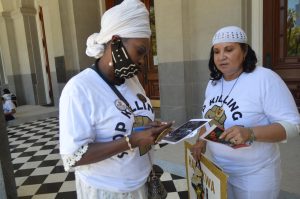
Asale Haquekyah Chandler, left, Yolanda Banks, right. Photo by Antonio Harvey.
Banks frequently joins other grieving African American families from around California who have lost loved ones to police violence for rallies and vigils like the one AOUON held in Sacramento.
Participants arrived from Riverside, Los Angeles, San Bernardino, Bakersfield, Vallejo, Richmond, Oakland, San Francisco, Fresno and other places in the state. Most of the people in attendance were people who have been impacted by police violence.
On the front steps of the State Capitol, large black-and-white photos of people of color who have been victims of police deadly force were on display. According to Love Not Blood Campaign, organized by Oscar Grant’s uncle Cephus Johnson, police violence has claimed the lives of 1200 people in California since 2009.
Among those pictured and whose relatives were present were Oscar Grant, shot and killed by BART police in 2009; Kenneth Harding Jr. and Mario Woods, shot and killed by San Francisco police in 2011 and 2015 respectively, Pedie Perez, killed by police in the city of Richmond in 2014, James Rivera and Colby Friday, killed by Stockton Police in 2010 and 2016 respectively and Stephon Clark, killed by Sacramento police in March 2018.
Asale-Haquekyah Chandler (pronounced “Ah-SAH-lah”) made the trip east to Sacramento from San Francisco to support Banks and the other families involved with “Stop Killing Us.” Chandler is hosting the “One Life Walk: A Silent Walk Parade Protest” in downtown San Francisco July 28.
Chandler, who ran unsuccessfully for the San Francisco Board of Supervisors District 10 seat in 2018, has also been affected by violence, but not at the hands of law enforcement. Her 19-year-old son Yalani Chinyamurindi, while on a lunch break in San Francisco, was shot and killed, along with three individuals he knew.
Banks, who lives on a rural farm in Calaveras County, told California Black Media that the events that AOUON stage are “painful but therapeutic.”
The pain and passion expressed by Banks, Chandler, and other participants (who each read aloud the names of the departed) was evident.
There were new members to this circle of grief and woe. Relatives of Erik Salgado, killed by the California Highway patrol in Oakland on June 6, and San Francisco’s Sean Monterrrosa was killed on June 2 by police in Vallejo. They praised their predecessors for the work done to get justice for their loved ones.
Several lawmakers emerged from the State Capitol to support the event and stand with the families. They included African American legislators Sen. Holly J. Mitchell (D-Los Angeles), Sen. Steven Bradford (D- Los Angeles), and Assemblyman Kevin McCarty (D-Sacramento).
McCarty authored a constitutional amendment, ACA 6, which will be on the general election ballot in November. Known as the “Free the Vote Act,” ACA 6 will seek voters’ approval to restore voting rights to former inmates on parole.
Activism
Oakland Post: Week of April 24 – 30, 2024
The printed Weekly Edition of the Oakland Post: Week of April 24 – 30, 2024

To enlarge your view of this issue, use the slider, magnifying glass icon or full page icon in the lower right corner of the browser window. ![]()
Activism
Oakland Post: Week of April 17 – 23, 2024
The printed Weekly Edition of the Oakland Post: Week of April 17 – 23, 2024

To enlarge your view of this issue, use the slider, magnifying glass icon or full page icon in the lower right corner of the browser window. ![]()
Activism
Oakland Schools Honor Fred Korematsu Day of Civil Liberties
Every Jan. 30, OUSD commemorates the legacy of Fred Korematsu, an Oakland native, a Castlemont High School graduate, and a national symbol of resistance, resilience, and justice. His defiant stand against racial injustice and his unwavering commitment to civil rights continue to inspire the local community and the nation. Tuesday was “Fred Korematsu Day of Civil Liberties and the Constitution” in the state of California and a growing number of states across the country.

By Post Staff
Every Jan. 30, OUSD commemorates the legacy of Fred Korematsu, an Oakland native, a Castlemont High School graduate, and a national symbol of resistance, resilience, and justice.
His defiant stand against racial injustice and his unwavering commitment to civil rights continue to inspire the local community and the nation. Tuesday was “Fred Korematsu Day of Civil Liberties and the Constitution” in the state of California and a growing number of states across the country.
One OUSD school is named in his honor: Fred T. Korematsu Discovery Academy (KDA) elementary in East Oakland.
Several years ago, founding KDA Principal Charles Wilson, in a video interview with anti-hate organization “Not In Our Town,” said, “We chose the name Fred Korematsu because we really felt like the attributes that he showed in his work are things that the children need to learn … that common people can stand up and make differences in a large number of people’s lives.”
Fred Korematsu was born in Oakland on Jan. 30, 1919. His parents ran a floral nursery business, and his upbringing in Oakland shaped his worldview. His belief in the importance of standing up for your rights and the rights of others, regardless of race or background, was the foundation for his activism against racial prejudice and for the rights of Japanese Americans during World War II.
At the start of the war, Korematsu was turned away from enlisting in the National Guard and the Coast Guard because of his race. He trained as a welder, working at the docks in Oakland, but was fired after the bombing of Pearl Harbor in 1941. Fear and prejudice led to federal Executive Order 9066, which forced more than 120,000 Japanese Americans out of their homes and neighborhoods and into remote internment camps.
The 23-year-old Korematsu resisted the order. He underwent cosmetic surgery and assumed a false identity, choosing freedom over unjust imprisonment. His later arrest and conviction sparked a legal battle that would challenge the foundation of civil liberties in America.
Korematsu’s fight culminated in the Supreme Court’s initial ruling against him in 1944. He spent years in a Utah internment camp with his family, followed by time living in Salt Lake City where he was dogged by racism.
In 1976, President Gerald Ford overturned Executive Order 9066. Seven years later, the 9th Circuit Court of Appeals in San Francisco vacated Korematsu’s conviction. He said in court, “I would like to see the government admit that they were wrong and do something about it so this will never happen again to any American citizen of any race, creed, or color.”
Korematsu’s dedication and determination established him as a national icon of civil rights and social justice. He advocated for justice with Rosa Parks. In 1998, President Bill Clinton gave him the Presidential Medal of Freedom saying, “In the long history of our country’s constant search for justice, some names of ordinary citizens stand for millions of souls … To that distinguished list, today we add the name of Fred Korematsu.”
After Sept. 11, 2001, Korematsu spoke out against hatred and discrimination, saying what happened to Japanese Americans should not happen to people of Middle Eastern descent.
Korematsu’s roots in Oakland and his education in OUSD are a source of great pride for the city, according to the school district. His most famous quote, which is on the Korematsu elementary school mural, is as relevant now as ever, “If you have the feeling that something is wrong, don’t be afraid to speak up.”
-

 Activism4 weeks ago
Activism4 weeks agoOakland Post: Week of March 27 – April 2, 2024
-

 #NNPA BlackPress4 weeks ago
#NNPA BlackPress4 weeks agoCOMMENTARY: D.C. Crime Bill Fails to Address Root Causes of Violence and Incarceration
-

 #NNPA BlackPress4 weeks ago
#NNPA BlackPress4 weeks agoMayor, City Council President React to May 31 Closing of Birmingham-Southern College
-

 #NNPA BlackPress4 weeks ago
#NNPA BlackPress4 weeks agoBeloved Actor and Activist Louis Cameron Gossett Jr. Dies at 87
-

 Community1 week ago
Community1 week agoFinancial Assistance Bill for Descendants of Enslaved Persons to Help Them Purchase, Own, or Maintain a Home
-

 Activism3 weeks ago
Activism3 weeks agoOakland Post: Week of April 3 – 6, 2024
-

 Business1 week ago
Business1 week agoV.P. Kamala Harris: Americans With Criminal Records Will Soon Be Eligible for SBA Loans
-

 Activism2 weeks ago
Activism2 weeks agoOakland Post: Week of April 10 – 16, 2024


